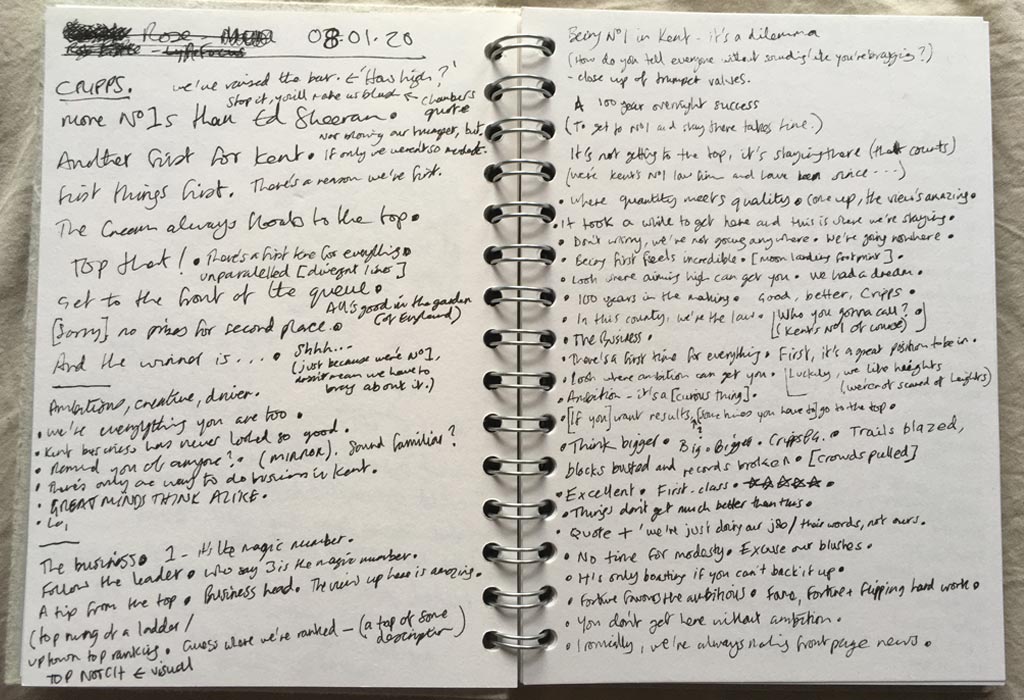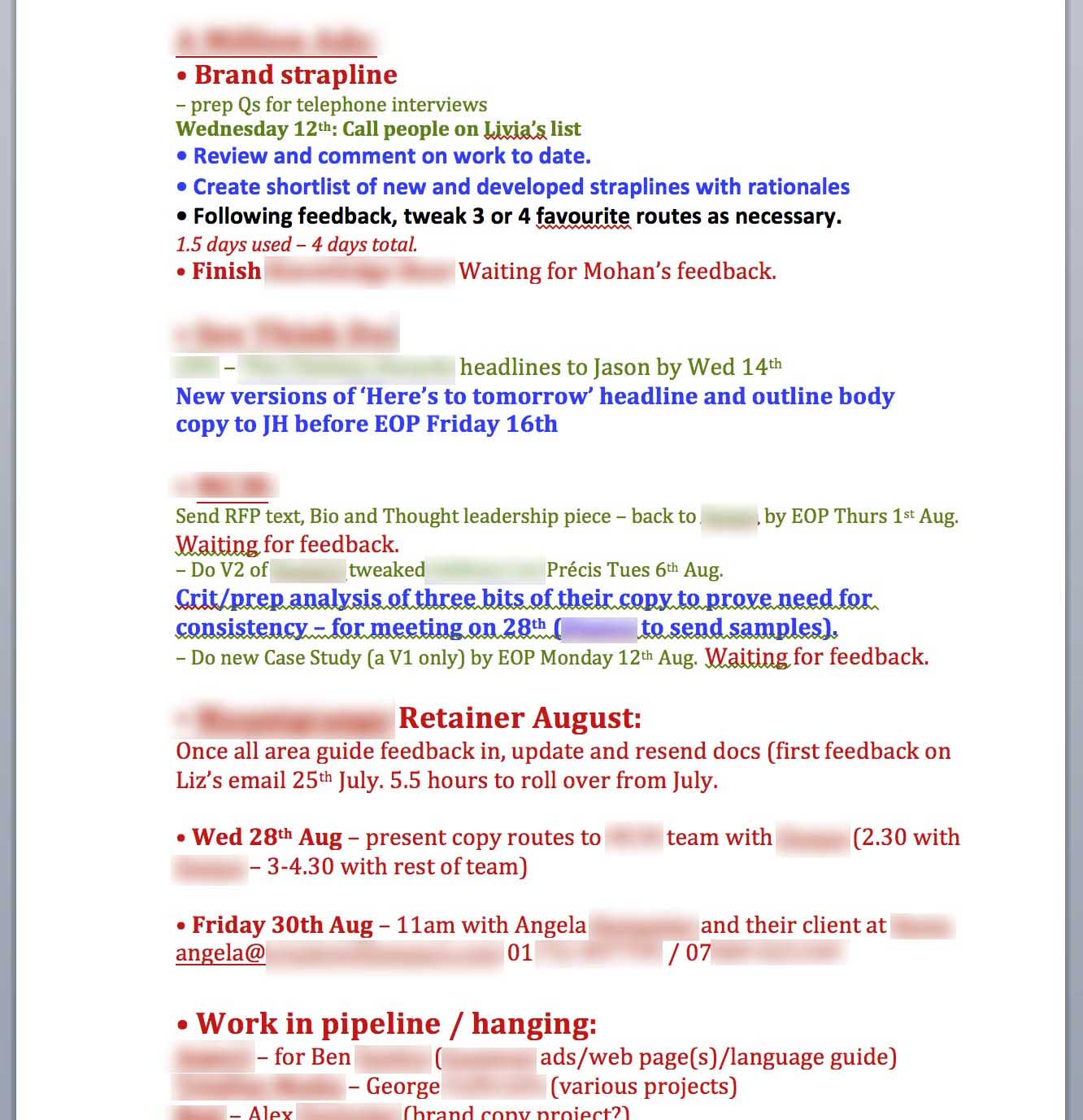6 steps to simplify your life and be a better freelance writer

Being a freelance writer isn’t easy.
Who does the new business? I do. Account handling? Me. Bookkeeping? Me. Who organises the office parties? That’ll be yours truly again.
Then there’s the writing itself. Copywriting can be painfully difficult – very enjoyable, but often an uphill struggle.
But just because it isn’t easy, it doesn’t mean we can’t make it simpler.
6 steps to simplify your life and be a better freelance writer
A friend of mine who works in the city has to wear a crisp, collared shirt every day. He’s a highly paid consultant with hectic schedules. His wardrobe is full of shirts – every one of them exactly the same. Same style. Same spotless white cotton. As he puts it, “That’s one less decision I have to make each day”.
When he died, Mahatma Gandhi only had six possessions – a watch, glasses, dhoti, eating bowl, sandals and a battered copy of the Bhagavad Gita. This is a man who led millions of people to freedom. He didn’t even have a Toggl subscription (OK, this was half a century before the Internet, but you get my drift).
So, with this in mind, it’s time to simplify.
Step 1 – simplify your toolkit
How often have you seen a social media post along the lines of ‘All the apps you’ll ever need to organise your life’? Or, ‘The top 10 gadgets that no freelance writer should be without’?
OK, this one really is simple. If you have a notepad and pen, a laptop with word processing software, and an Internet connection, you have everything you need to kick off a career as a freelance writer.
A notepad and pen means you can work anywhere. An idea hits you in the middle of the night? Notepad and pen to the rescue. No battery life worries, no time wasted re-booting. It’s old-school, but it works a treat.
A laptop, Word and the Internet – for researching, writing and organising your working life, this is about as complicated as things need to get.
I have a seven-year-old MacBook. It has an in-built clock, calendar and text editor. It lets me connect to the www and send/receive emails. Microsoft Office lets me write, copy, paste and save versions to my client folders, and create spreadsheets.
On the freelance writer’s must-have-technology list, that’s about everything covered. OK, you’ll need a phone and a kettle, but adding more devices and apps really isn’t going to make you any better at the day job.
I know that some copywriters will disagree, but I’m right and they’re wrong.
Step 2 – de-clutter your work environment
I was freelancing in a London ad agency many years ago. They’d hired me to come up with campaign ideas for the PalmPilot PDA (that shows you how long ago it was). I’d been locked away in a little office for three days with the brief, half a dozen layout pads and a couple of fistfuls of magic markers.
There were piles of rough layouts strewn across three desks. Screwed up reject ideas billowed out of the waste bin. This was the way I loved to work; spewing out all the ideas, leaving any major filtering for later.
Mid-scribble and the MD walked in. “What the… clear all this crap up, it looks like a pig sty.” As I started to pull all the scamps into neat piles, he walked up to me and in a Fatherly way, told me that as a freelancer, part of my job was to fit in with their way of working. To be almost invisible. For him, a tidy desk was a sign of a tidy mind and that little pep talk left a big impression.

Like many creative bods, I’m a bit of a hoarder, but I’ve found that de-cluttering helps to lighten the mental load.
Step 3 – limit the distractions
Modern life has a great big bag of interruptions to throw us off the scent of a great idea.
We have briefs to answer and deadlines to hit. We need to focus on the job in hand. Beeping phones, tinkling notifications and YouTube videos of kittens really don’t help the writing process.
As copywriters, we have brains brimming with all sorts of brilliant (and stupid) ideas, but we need to tame them into some semblance of order. If you’re in thinking mode or setting out on a journey of a thousand words, switch those notifications off. Close the door, put your phone on silent and do some bloody work.
If creative block comes a-knocking, then there are all sorts of techniques to get the creativity flowing again, but unwanted distractions need to be put in their place.
Step 4 – get your priorities right
Being a freelance writer can be a juggling act at times. There are usually several jobs on, all at different stages. Without some kind of system, it’s easy to get out of sync, or horror of horrors, forget a deadline.
Rather than get tricksy and install yet another diary management app, in the interest of simplicity I’ve created a no-frills ‘To Do’ list in Word. I visit and update it every day.

Black = future task – be aware, but there’s stuff to do first
Red = live task, but not an immediate priority
Blue = get on with this, there’s a deadline
Green = job done – at least for now
I also use bold and underlining to mark out the urgent bits. And when it’s really busy, I number things to stop me lapsing into doing all the fun jobs first.
I know exactly what I’m supposed to be doing. I never miss deadlines. It’s a simple system and it works.
Step 5 – simplify your thinking
A single-minded, clear brief is the first step to doing great work. If your client doesn’t know how to communicate what they need you to do, you’re in trouble. There are a few tried and trusted criteria that need outlining. Here’s a post all about how to write a creative brief.
Point number 5, ‘the USP’, is of particular importance when it comes to crafting a hook that makes your idea hit home.
The question is, ‘If your reader only remembered one thing, what should it be?’ If you don’t have the answer, you don’t have a brief.
Step 6 – simplify your work
The simplest ideas are the best. There are exceptions to the rule of course, but with the amount of clutter in the world, simplicity is often the best way to cut through and get noticed.
As a freelance copywriter, my job, more often than not, is to make complex subjects easy to undersand. To strip convoluted ideas back to their bare bones.
A great discipline, whatever you’re writing, is to work out what it would say if it were a poster.
Posters are perhaps the purest and simplest (simple, not easy) form of marketing communication. You’ve got a second or two to get your message across. A handful of words to capture your audience.
If you’re up for it, you can hear some of the best creative brains chewing the fat over what makes a great poster at Behind The Billboard.
And Dave Dye has put together a fantastic post – The fewer words you use – that brilliantly demonstrates the power of simplicity in writing.
So, if this blog post were a poster, what would it look like? Probably something like this:

Jonathan Wilcock (that’s me) is a Senior Freelance Copywriter.
You can drop me a line here, or email jonathan@sowhatif.co.uk